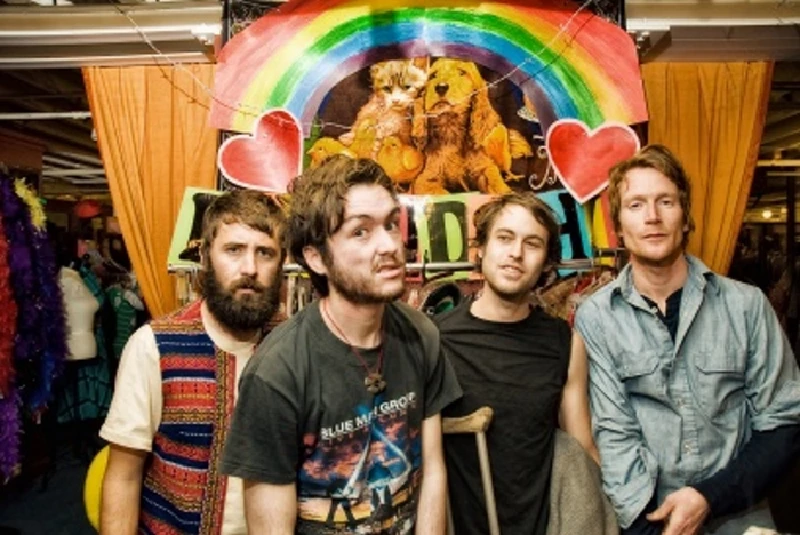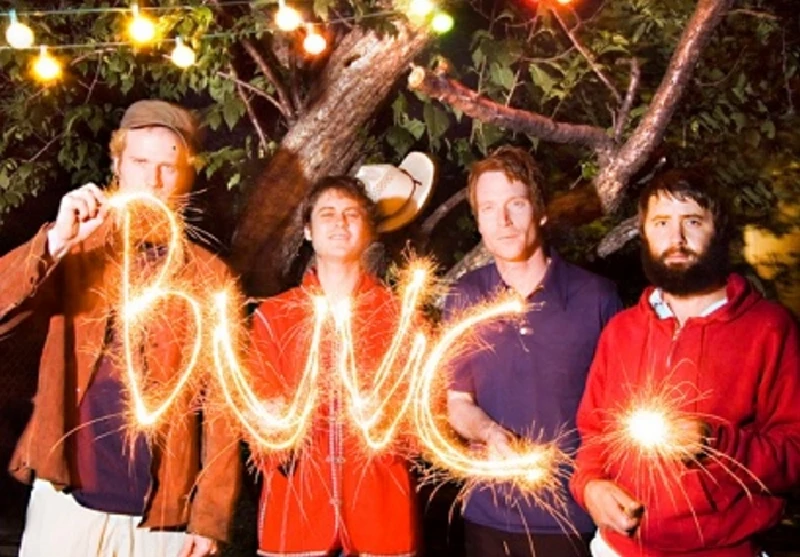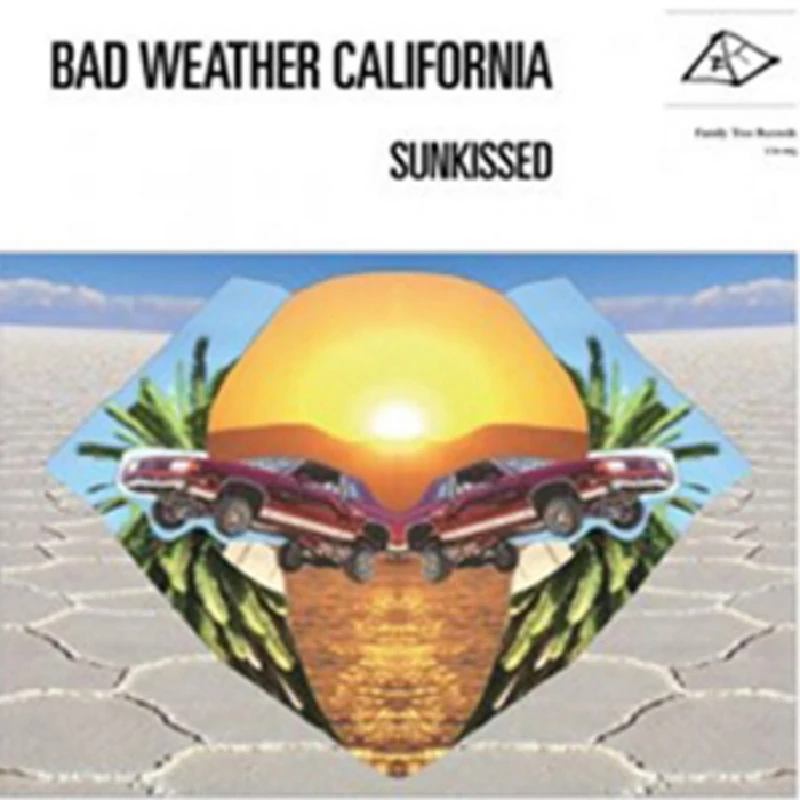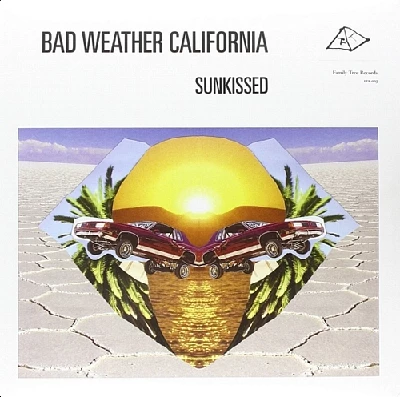Bad Weather California - Interview
by Jamie Rowland
published: 16 / 4 / 2012

intro
Jamie Rowland chats to Chris Adolf, the front man with Denver-based band bad Weather California about their second album which has just been released on Akron/Family’s Family Tree Records, touring and playing back-up for Daniel Johnston
Denver, Colorado’s Bad Weather California released ‘Young Punks’, their first album of “sunshine music” back at the start of 2009; the culmination of several years writing, playing and recording together; the culmination of many more years writing and recording for the band’s founder and song-writer, Chris Adolf. With bassist Joe Sampson, guitarist Adam Baumiester and drummer Logan Cocoran joining him to beef up his sound and expand his vision, Adolf has been able to recreate some of the sonic majesty he discovered amongst his parents’ record collection while growing up. Earlier this year, BWC released their second album, ‘Sunkissed’ on Akron/Family’s Family Tree Records – and if you missed it when it came out, I urge you to pick it up in time for the festival season, because it’s the kind of sun-baked, rock’n’roll party record that Summers are made of. We got hold of Chris at his home in Denver to talk about touring, playing back-up for Daniel Johnston and the importance of swinging your pendulum the other way. PB: I understand you’ve been on tour since January, right up until a few days ago; is that right? CA: Right, right; we’ve been out for a while. PB: How did it go? CA: It was great! The first part of the tour in January – starting on January first, actually – was with Akron/Family. We went on the East Coast of the United States with Akron/Family, and the Mid-West and all that. And we got home like January 30th or something like that, and we were home for like, two weeks and then we left again for the West Coast by ourselves... it was amazing, you know? PB: Do you find a lot of difference in how you go down with audiences depending on whether your playing the East or West Coast? CA: A little bit, yeah – the East Coast is a little bit more serious, but that’s not a rule. That’s just generally. The West Coast is a little more laid-back. I mean there are great shows on the East Coast too. We do a little better on the West Coast just because it’s closer to our home; we’ve been there a lot more, we’ve played there a lot more. It’s harder for us to get to the East Coast, just because it’s so far away. PB: Your sound certainly seems to me to be more suited to the West Coast, or at least my idea of the West Coast. It’s kind of a sunny sound, I suppose CA: Yeah, for sure. PB: You were at SXSW, too? CA: Yeah, we were. That was the end of our West Coast tour. We came back from the North West. We were in Texas for four days. PB: How was it? I’ve never been, but I hear about it every year and would really like to. CA: My suggestion would be, if you’re gonna go, go as a spectator not as a band. It is a lot of work; I mean the streets are all closed, they’re full of people – they’re full of drunk people – and you have to get your equipment from one venue, to another venue to another venue while the streets are all closed. At the same time, all the streets that aren’t closed, all the way through there’s nowhere to park your van. So it’s like, you get your equipment there, you have to play in twenty minutes, and someone has to go find somewhere to put the van while you play – a legal place to put the van, you know? Man, it’s hectic. Once you have a guitar on and you’re playing to people, that’s always a blast though. PB: What are the crowds like there? There’s so much to see; are people drifting in and out during shows? Are they all exhausted from wandering around in the hot Texan sun? CA: Towards the end I guess people are a little worn out, but people stick around you know. To me – if they’re anything like me, it’s such a pain in the ass to get from one place to another. I find a place to be and I’m like, “Cool; I know there’s something else going on down the street but I’m here. There’s something going on right here too, so why would I go anywhere?” I remember there was one show in Texas where we played at the same venue two times, about two hours apart, and there was a lot of the same people both times, and they were having fun both times. PB: So is that quite usual for SXSW? How many shows would you be expected to be playing at SXSW? CA: We played five altogether. We played one with the people that Austin Psych Fest put together, um...I’m going to get confused; it’s all a blur for me right now...one that are booking agency Danny Rose put together. They’ve got a bunch of great bands, like BRONCHO, Howlin’ Rain, the Growlers, He’s My Brother She’s My Sister. They’ve got a bunch of great bands on the roster, and that was a fun show. We played two up on this rooftop, and then we played one... in some other bar [laughs]. It all runs together. BRONCHO was probably my favourite band that we saw, that whole time. PB: Did you get the chance to see many shows while you were there? CA: I really didn’t. By the time we’d played all those shows, I was ready to find a place to sleep. The bands that I got to see were just out of convenience, but I really liked them. The Bahamas played a show with us, so I got to see them because they were on after us. They were great, Howlin’ Rain’s great. So I got to see some cool shows PB: I understand you started Bad Weather California as a live band to play your home recordings. CA: Yeah, yeah. You just make music however you can. At home on borrowed cassette recorders, until I had songs. And I’d play live shows sometimes, and it kind of just snowballed and grew organically. I didn’t ever get four guys together and go “now we’re a band!” PB: You didn’t set out on some kind of Magnificent Seven-type mission to find the perfect group? CA: No, not at all. It was kind of like, “Oh, you play all these songs” and, “Yeah, I play shows – do you want to help me play this show next week?” “Sure!” The first guy along was Joe, who plays bass. Well, we could go back even further than that. There were all sorts of people, who came in for one show here, one show there. Joe’s the first guy who stuck around. Actually Marissa, who I live with now – she’s not in the band – but she was the first person to really stick with it; she went on tours with me and stuff. When she quit Joe started with me, and it became more of a rock band. We’ve had a real changing cast over the years, but now we’ve got a solid line-up of four people. It was never a group of guys going “let’s the four of us start a band!” It just kind of happened over the years. PB: And did having that line-up change those songs you had written by yourself? CA: Oh yeah, definitely. Sometimes it’s like letting go of your baby. Putting it into other peoples’ hands. But at the same time it’s really cool to see how it can morph with the other peoples’ brains who are involved. PB: And do you still write songs in the same way, or is it more of a collaborative process now? CA: As a rule now, we never try to sit and work on a song too much. If a song comes to me while I’m at home then I’ll bring it to the band, but it has to come to me; I can’t sit down and force it. And then when we get together sometimes we have nothing new, and we’ll play some songs that we know just so we can keep up on them. But to write the songs together, it’s the same thing; you can’t force it. So what we do is just get together and make noise, and sometimes songs come out of that. And then I’ll take it home and make lyrics and refine it a little bit. But they have to kind of write themselves. Those are the best ones, the ones that just happen. Sometimes they don’t happen, but you can’t force it. Sometimes it’ll be like, “We didn’t get a new song this week; we didn’t get a new song this month!” But then one week, three will happen. PB: I suppose. if you’re sitting down and trying to force songs out, it’s becoming a bit too much like hard work? CA: There’s enough hard work already in being a band. Maintaining the van, website crap, booking shows...we’re dealing with a TV commercial thing right now, using one of our songs so I have to figure that stuff out; make sure that it’s copyrighted properly. There’s enough work... making sure you get paid! Being at the venue until 3 a.m. because they aren’t paying you, and you have to be on the phone with different people. There’s enough work involved with being in a band. The music part shouldn’t be work... We work hard as a band, but the artistic inspiration just has to happen. PB: I think bands that try to force songs out are normally those who are trying to fit in with a particular scene or fashion in music; that’s when artists start to sound a little phoney. CA: Yeah, that’s when you start getting a lot of bands sounding the same too. As aesthetic trends come and go, you can definitely see which bands are setting trends, and which bands are riding the train. Right now, there’s hundreds of bands that sound really reverbed out and have a kind of 80’s midi-synthesiser, instructional video sound. There’s a million of those; I think there’s some good ones, but there’s a million of them, you know? [laughs] That’s right now. Next week it might be something else. You’ve got to not think of it. It’s fun to watch, but when you’re in there making your own stuff, you can’t think about that. You have to let go of everything, and if some kind of heavy metal band comes out, well that’s what happened. If a jazz group comes out, that’s what happened. PB: Would you agree that BWC wears its influences on its sleeve? That’s not to say that you sound exactly like those bands, but you can hear what music shaped your work. CA: Yeah, I don’t think we’re cutting edge; I wouldn’t claim to be. We’re a pop group that grew up listening to rock’n’roll for the most part, and punk rock music. You have to be yourself, and hopefully you have a new take on the collective consciousness. PB: When I think of Denver, Colorado, I think of somewhere that’s cold and snowy, and not really what one would imagine when you listen to Bad Weather California’s summery, West Coast sound... CA: Well, culturally Denver is the West. I define the East and West like this: if you’ve got low-riders, if you’ve got a real strong Mexican influence in your cities – you’re in the West. Denver is definitely culturally the West, and I grew up west of Denver; out in the desert. Denver, it’s high and it gets cold, but it’s very dry here, and you don’t get the gnarly winters, like you get in the North East, like Milwaukie, Detroit, Chicago. Those places are unbearable in the winter. But Denver? Nah! It’s quite mild. I think it’s the highest city – not the highest town, but the highest big city. Denver’s out in the middle of nowhere, too. It’s a big city, but unlike all the other cities in the States...I take that back; it’s Denver and Salt Lake City. But they’re the only two. There are no other large cities around us, for an eight-hour radius. In any direction. We’re really on an island. I’m talking, driving on the highway at 70, 75, 80 miles an hour. Eight hours in any direction, you’re just in farmland. PB: Does that sense of isolation affect the kind of music that’s coming out of Denver, or the scenes that come up in the city? CA: I’ve heard talk over the years of a “Denver Sound”. I have never... it’s my personality to, whatever is going on, try to move the other way. There are some bands now that I think I really relate to, here in Denver. I don’t know if we influenced them or not – we’ve been around for a long time – but Sauna is a great band that plays really well with Bad Weather California. Night of Joy is a band that I think play really well with Bad Weather California. But when I started Bad Weather California and I started all this sunshine music, it was a reaction to what I saw going on in Denver. There were a lot of really dark bands, a lot of bands that were taking themselves very, very serious in an intellectual way. Everything was very dark and emotional - and pastoral. And I’m from the country – I’m from the country. I grew up in the country, but we were listening to rap music; we weren’t listening to Wilco and country music. And I just said, “No, no. Let’s take this aesthetic of more sunshine, let’s take this aesthetic more fun. Let’s take it more urban”; because we all lived in the city. And it started out with me just swinging my pendulum the other way, from what I saw going on in Denver. There were a lot of these...Tom Waits and Nick Cave being the very big influences on what they would call the “Denver Sound”. Bad Weather California’s kind of a reaction to that; just trying to be the opposite of that. Also, you know I look back on rock’n’roll and it was made to be dance music – it wasn’t made to sit and rub your chin to. It was made to be in the streets for people, in little joints; dancing. So part of it is just my reaction, and part of it is – if you trace rock’n’roll back to its roots, it’s going to get fun! [Laughs]. PB: I think that definitely comes across on ‘Sunkissed’; I’ve certainly been bopping and singing along to it in my car on the way to work. CA: In the shows, we like to have a lot of fun. I don’t like to force it, but yeah. PB: So is it easier to build that kind of a fun atmosphere on the West Coast? CA: Well, I just think the East Coast knows less about us. Also, you’ve got to think; when we were on tour on the East Coast, we were opening up for Akron/Family. We really had to win. We really had to earn those people, because they were waiting for Akron/Family. They paid their money to see Akron/Family, and we did – we earned people. The West Coast is starting to know us...there were people at the last shows who were at these shows; so they’re getting to know us. PB: ‘Sunkissed’ came out on Akron/Family’s own record label, Family Tree. How did you become involved with those guys? Was it just through playing shows together? CA: Yeah, I think it was about three years ago; we got invited to play a show in Vail, Colorado, which is this little town up in the mountains. It was just at this little bar, and it wasn’t the greatest show or anything, but just as buddies, we hit it off; just personality-wise. We hit it off, and we gave them a record – not to be all “Hey, here’s our record!” in an industry, wink-wink kind of way; just as friends, like “Here’s our shit, check out what we do”. Just as a gift; as friends. And they really liked it, and they’re in a position where they can help, and they have. Though they didn’t have the label at the time; they started this label so they could put out our record. I mean, they were releasing hand-made records of their own experiments, just to sell at shows, but they decided to make it a proper label for us. We relate to those guys, I relate to those guys. They’re guys that can have just as much fun sitting around, joking and talking with a close group of friends over being out at a crazy party. We’re all just kind of more mellow people, like that. PB: And their shows are a lot of fun too CA: Yeah, and that was the thing with the first night we met them; they had put us all in the same hotel, and we were hanging out at the swimming pool there. It was like, “Hey, we’re having so much fun hanging out – oh, is it time to go play the show now?” It wasn’t about music; it was about us hanging out, all sitting together you know? And then it was like, “Oh man, I forgot we have to go play!” PB: You were also Daniel Johnston’s backing band at one point CA: Yeah, yeah. We backed him up at this big show here in Denver; at the Ogden Theatre, which is a really big theatre here – famous people like Daniel Johnston play there. And yeah, we were his backing band, with two days notice. We got the call, and they sent us a list of songs; a list of about thirty songs. We’re big fans, and they sent us a list of about thirty songs and they said to choose eight of them or something like that, and let them know which eight we wanted to do. We met Daniel the day we played. It was really nerve-wracking; I was really nervous. You’ve heard his early recordings? It’s beautiful and it’s just organically inspired music. It’s out of thin-air that music; it’s just happening through him, really. However some of the timing – he’s just so off and carried away with it – some of the timing is off and sloppy, and I was nervous that as a band we’re going to have to watch Daniel and if he jumps to a different rhythm or something we’ll just have to follow him; we’ll have to really, really listen and follow this guy. We can’t just get into a groove and play the song like we would with a normal musician. We practiced the songs as best as we could. but we didn’t really know what to expect. And when we got on stage for rehearsal, that wasn’t the case. Daniel knows what to do; he’s a great musician. We set down a groove, and he’s right there in the pocket with us. We didn’t have to do anything; he did all the work. We just played the chords and the rhythm, the rest is him! Also, it’s a big venue and we’re a loud rock band, so I was also worried about that, because some of his stuff is really tender. But with us, he really rocked it. It was great; it was a lot of fun. PB: Thank you.
Band Links:-
https://www.facebook.com/badweathercalifornia/Picture Gallery:-


reviews |
|
Sunkissed (2012) |

|
| Sunny-sounding and summery debut album from West Coast act, Bad Weather California |
most viewed articles
current edition
Spear Of Destiny - InterviewRobert Forster - Interview
Fiona Hutchings - Interview
When Rivers Meet - Waterfront, Norwich, 29/5/2025
Carl Ewens - David Bowie 1964 to 1982 On Track: Every Album, Every Song
Chris Wade - Interview
Brian Wilson - Ten Songs That Made Me Love...
Pistol Daisys - Waterfront, Norwich, 29/5/2025
Credits - ARC, Liverpool, 17/5.2025
Nils Petter Molvaer - El Molino, Barcelona, 24/4/2025
previous editions
Heavenly - P.U.N.K. Girl EPBarrie Barlow - Interview
Boomtown Rats - Ten Songs That Made Me Love....
Oasis - Oasis, Earl's Court, London, 1995
Dwina Gibb - Interview
Beautiful South - Ten Songs That Made Me Love...
Sound - Interview with Bi Marshall Part 1
Manic Street Preachers - (Gig of a Lifetime) Millennium Stadium, Cardiff, December 1999
Trudie Myerscough-Harris - Interview
Serge Gainsbourg - Ten Songs That Made Me Love...
most viewed reviews
current edition
Peter Doolan - I Am a Tree Rooted to the Spot and a Snake Moves Around Me,in a CircleGarbage - Let All That We Imagine Be The Light
Vinny Peculiar - Things Too Long Left Unsaid
Little Simz - Lotus
John McKay - Sixes and #Sevens
Suzanne Vega - Flying With Angels
HAIM - I Quit
Vultures - Liz Kershaw Session 16.06.88
Billy Nomates - Metalhorse
Eddie Chacon - Lay Low
Pennyblackmusic Regular Contributors
Adrian Janes
Amanda J. Window
Andrew Twambley
Anthony Dhanendran
Benjamin Howarth
Cila Warncke
Daniel Cressey
Darren Aston
Dastardly
Dave Goodwin
Denzil Watson
Dominic B. Simpson
Eoghan Lyng
Fiona Hutchings
Harry Sherriff
Helen Tipping
Jamie Rowland
John Clarkson
Julie Cruickshank
Kimberly Bright
Lisa Torem
Maarten Schiethart